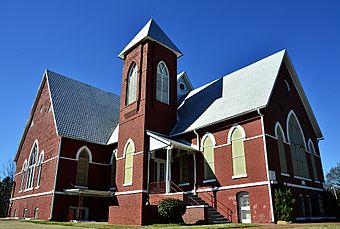First Baptist Church (Selma, Alabama) facts for kids
Quick facts for kids |
|
|
First Baptist Church
|
|

First Baptist Church of Selma in 2013
|
|
| Location | 709 Martin Luther King, Jr. St., Selma, Alabama |
|---|---|
| Area | less than one acre |
| Built | 1894 |
| Architect | Dave Benjamin West |
| NRHP reference No. | 79000383 |
| Added to NRHP | September 20, 1979 |
First Baptist Church is a special historical building located at 709 Martin Luther King, Jr. Street in Selma, Alabama. This church has a long history, especially for African American communities. It was built in 1894 in a beautiful style called Gothic Revival. The church is most famous for its important role in the Civil Rights Movement, a time when people worked hard for equal rights for all people. It was added to the National Register of Historic Places in 1979 because of its historical importance.
Contents
A Center for Civil Rights
First Baptist Church played a very important part in the Civil Rights Movement during the 1960s. This movement worked to end unfair treatment and gain equal rights for African Americans.
Opening Doors for Change
In 1963, under the leadership of Reverend M. C. Cleveland, the church became the first in Selma to open its doors to the Dallas County Voters League. This group worked to help African Americans register to vote. The church provided a safe place for meetings and activities.
Training for Non-Violence
For the next two years, First Baptist Church was a main spot for important meetings. The Student Nonviolent Coordinating Committee (SNCC) held "mass meetings" and taught people about non-violent ways to protest. These sessions helped prepare many young people for peaceful demonstrations.
Planning Key Demonstrations
In late 1964, important meetings took place at the church. People gathered to plan large rallies and demonstrations that happened in early 1965. These plans led to the famous Selma-to-Montgomery march.
Speeches from Leaders
During the early months of 1965, many important leaders spoke at First Baptist Church. Martin Luther King, Jr. and Ralph Abernathy often spoke there. They were leaders of the Southern Christian Leadership Conference (SCLC), which had its main office nearby. They spoke nightly to young people gathered at the church, inspiring them to continue the fight for justice.
Continued Community Support
Even after the Selma-to-Montgomery march, First Baptist Church continued its important work. It remained a main center for the Student Nonviolent Coordinating Committee. The church also helped people who lost their jobs because of their involvement in the movement. It served as a place to give out food and clothing to those in need.
In 1963 under the leadership of Reverend M. C. Cleveland, the church became the first in the city to open its doors for activities and meetings of the Dallas County Voters League. During the next two years, the church was a focal point of the mass meeting and non-violent teaching sessions sponsored by the Student Nonviolent Coordinating Committee, and in late 1964, meetings were held in the church to plan the mass rallies and demonstrations of early 1965 which culminated in the Selma-to-Montgomery march. During the early months of 1965, Martin Luther King, Jr., Ralph Abernathy, and other leaders of the Southern Christian Leadership Conference, headquartered in Brown's Chapel half a block away, spoke nightly to the youth gathered at First Baptist Church.
After the march, the church continued to headquarter the Student Nonviolent Coordinating Committee and continued to serve as a distribution center for food and clothing for those persons who suffered the loss of jobs.
References
See also
 In Spanish: Primera Iglesia Bautista (Selma) para niños
In Spanish: Primera Iglesia Bautista (Selma) para niños
 | Jackie Robinson |
 | Jack Johnson |
 | Althea Gibson |
 | Arthur Ashe |
 | Muhammad Ali |



